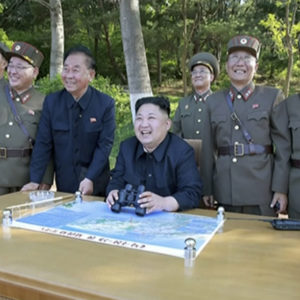WASHINGTON — Will he or won’t he?
There’s no easier way to get into an argument than to take sides on one overwhelming question: Will President Donald Trump actually stage a pre-emptive strike on North Korea and risk Korean War II?
After getting off the phone with Russia’s President Vladimir Putin, however, Trump may be convinced that the best solution for now is to impose new sanctions and enforce the sanctions already in place. Putin advised Trump to work out a solution based on “freeze for freeze” — that is, that Kim Jong-un will refrain from testing more nukes and missiles in exchange for the United States and South Korea calling off military exercises.
Trump, who’s battling claims that the Russians waged cyberwarfare in order to win last year’s presidential election for him, has pleaded with both Putin and China’s President Xi Jinping to please get Kim to go along with demands for talks about his nukes and stop threatening the United States.
The problem is that neither of those two leaders are at all willing to do much other than agree to support condemnation in the United Nations of North Korea’s nuclear program. They may also profess to vote for sanctions in the U.N. Security Council, but neither is doing much to enforce them fully.
The differences became clear yet again at the United Nations when Secretary of State Rex Tillerson said indeed North Korea had to be persuaded to give up its nuclear program. That remark seemed like a reversal of Tillerson’s earlier comment that he would be glad to negotiate with North Korea “without preconditions,” but U.S. officials say Tillerson would still be glad to talk about anything the North Koreans want to discuss.
That view does not conflict with the U.S. position that North Korea has to abandon its nukes and missiles. The question is whether the U.S. position is in effect a “precondition.” The Americans say the North is setting the preconditions by refusing to talk about the issue.
In any case, Americans are stymied by the pressure exerted to come to a compromise that they believe will hopelessly undermine the firm line against North Korea. For that reason they are not happy about South Korean suggestions that U.S. and South Korean forces scale down their annual exercises during the coming Pyeongchang Olympics. U.S. military people, and South Korean defense officials as well, are wary of any proposal that forces them to give up what they have always said were strictly “defensive” maneuvers.
Americans acknowledge, however, that it may be necessary to postpone or cut back on the war games in order to reduce the chances of North Korea using them as a pretext for staging incidents that might detract from the glory of the Games. If South Korea’s government wants to soften the effect of military exercises during the Games, U.S. officials say there is little they can do about it.
“South Korea is our close ally, and we will accommodate their interests,” was the way one American diplomatically phrased the U.S. position. “We know the South Koreans are extremely proud to be hosting the Winter Olympics, and we want them to be a total success.”
In fact, the Americans have been going to great lengths to offer assurances that the United States will be sending a large team to the Olympics despite doubts as to whether that’s a good idea in view of North Korean threats. The U.S. ambassador to the United Nations, Nikki Haley, fueled concerns by raising the issue of safety for American athletes, but diplomats at the State Department denied the United States had any notion of not going to the Olympics.
U.S. military officials, though, are determined to work closely with South Koreans on coordinating defenses against the North. Most recently, several hundred U.S. and South Korean troops worked together on ways to get rid of “weapons of mass destruction” once they found them. How, for instance, do yo dispose of biological and chemical weapons — or a nuclear warhead?
“Not easy,” said a military analyst, but then, added, “We’ve got to find them first.”
That’s where analysts speculate as to whether Trump is determined eventually to attack North Korea if Kim Jong-un adamantly refuses to budge even under strengthened sanctions and global diplomatic pressure. In answer to the question, “Will he or won’t he,” the best response is that he is not going to attack right away — but the long-range future remains quite uncertain.
It’s with that uncertainty in mind that Chinese and Russian officials and analysts are warning of the risk of war in quite strong terms. The Chinese deputy U.N. ambassador, Wu Haitao, said flatly there should be “no military option” for settling the nuclear issue.
Tillerson, however, has said the United States has a number of “contingency plans” — up to and including a military response if North Korea fires a long-range missile in the direction of U.S. bases on Guam, Hawaii or elsewhere. To use one of President Trump’s favorite phrases, “We’ll have to see what happens” before we know the answer to the question — war or peace on the Korean peninsula.

